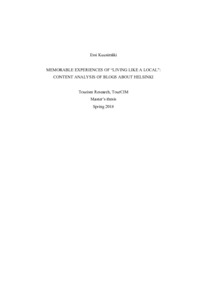Memorable experiences of “Living Like a Local” : content analysis of blogs about Helsinki
Kuusimäki, Essi (2018)
Kuusimäki, Essi
Lapin yliopisto
2018
openAccess
Julkaisun pysyvä osoite on
https://urn.fi/URN:NBN:fi:ula-201808101306
https://urn.fi/URN:NBN:fi:ula-201808101306
Tiivistelmä
The present research is concerned with the experiential dimensions of a memorable tourism experience within the notion of shareable tourism and particularly peer-to-peer accommodation. Both of the concepts, memorable tourism experiences and shareable tourism are significant in the accelerating competition of the present-day tourism industry. Only those experiences that are memorable have a possibility to influence travellers’ future behavioural intentions, leading to repurchases, word-of-mouth and company’s long-term profitability. In turn, there is a growing demand for tourism experiences that allow experiencing the destination authentically and “like a local”. Offering live like a local experiences is identified as a strategy for destination differentiation.
The aim of this research was to identify the experiential dimensions that are attached to a memorable “live like a local” experience in Helsinki, Finland. The study is employing qualitative methodology and interpretive paradigm. A content analysis with both deductive and inductive coding approaches was conducted for 14 blog texts in total written by travellers who visited Helsinki and locals living in the city. Memorable tourism experience (MTE) scale functioned as the deductive base for the analysis.
The results indicate that the memorable experience within shareable tourism and peer-to-peer accommodation in Helsinki is based on six experiential dimensions: knowledge, social interaction, novelty, sensory stimulation, involvement and surprise. These dimensions induced both positive and negative emotions. Locals living in Helsinki attached certain elements to the experience of living like a local: atmospherics, being in a place and places of hipster subculture. In general, travellers’ and locals’ experiences of Helsinki were different. The role of locals as gatekeepers to the local culture was identified as crucial; whenever travellers were connected to locals, it resulted in a more authentic experience. In these experiences, travellers attached authenticity to staying in peer-to-peer accommodation and social interaction with locals. Suggestions for further research include for instance applying the research in other destinations and with samples from different demographic backgrounds.
The aim of this research was to identify the experiential dimensions that are attached to a memorable “live like a local” experience in Helsinki, Finland. The study is employing qualitative methodology and interpretive paradigm. A content analysis with both deductive and inductive coding approaches was conducted for 14 blog texts in total written by travellers who visited Helsinki and locals living in the city. Memorable tourism experience (MTE) scale functioned as the deductive base for the analysis.
The results indicate that the memorable experience within shareable tourism and peer-to-peer accommodation in Helsinki is based on six experiential dimensions: knowledge, social interaction, novelty, sensory stimulation, involvement and surprise. These dimensions induced both positive and negative emotions. Locals living in Helsinki attached certain elements to the experience of living like a local: atmospherics, being in a place and places of hipster subculture. In general, travellers’ and locals’ experiences of Helsinki were different. The role of locals as gatekeepers to the local culture was identified as crucial; whenever travellers were connected to locals, it resulted in a more authentic experience. In these experiences, travellers attached authenticity to staying in peer-to-peer accommodation and social interaction with locals. Suggestions for further research include for instance applying the research in other destinations and with samples from different demographic backgrounds.
Kokoelmat
- Pro gradu -tutkielmat [4936]
